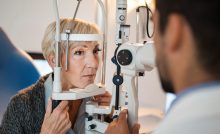Video Blog: All You Need to Know About Diabetic Eye Disease
Diabetes mellitus pertains to a group of metabolic conditions that causes high sugar content in your blood. This occurs when your body fails to properly respond to insulin or there’s inadequate production of this hormone. Over time, this problem may affect other parts of your body, like your eyes, leading to a complication known as diabetic eye disease (DED) or diabetic retinopathy. Let your expert optometrist from Vienna Eyecare Center talk about it in detail.
How It Happens
Increased glucose levels can make your blood more viscous, resulting in its sluggish flow. This may cause limited oxygen and nutrient delivery to your organs, including your eyes. This may affect your ocular processes, leading to vision problems.
Stages of Diabetic Retinopathy
According to your trusted eye doctor, there are two general classifications of DED. The non-proliferative or early phase does not usually have any manifestations. That said, your retinal blood vessels may eventually weaken, causing them to rupture easily. The blood may lead into the macula, the retina’s central region, resulting in macular edema.
During the proliferative or advanced stage, your eyes try to compensate the restricted blood supply by allowing the growth of abnormal blood vessels. Their tiny and fragile nature, however, causes their premature rupture and damage. This may result in blood clots forming in your eyes, which is why you may see blank spots across our visual field. Blurry eyesight and poor night vision may also happen. You may have impaired central vision as well, which may lead to blindness if the disease is left uncontrolled.
Our Suggested Treatment
Since DED is an asymptomatic condition, it’s essential to detect it as soon as possible. The earlier we identify it, the better chances we have of saving your vision. This is why having routine eye exams as part of your diabetic eye care is important, especially if you or any of your relatives are diabetic.
In every DED management, the main goal is to prevent its progression. We recommend following your doctor’s suggested diet and lifestyle changes. Make sure to take your diabetic medications as instructed too. Proliferative stage treatment may include vitrectomy and laser eye surgeries to remove blood clots and stop the growth of the abnormal blood vessels.
For more information about diabetic retinopathy, call us at (703) 938-7633 or complete our form. We serve patients from Fairfax and nearby VA areas.
Recent Posts
Can Children and Young Adults Develop Cataracts?
It's a common misconception that cataracts only affect the elderly. When discussing eye health issues…
How Is Astigmatism Treated?
Astigmatism represents one of the most common vision issues encountered by individuals, marked by an…
Am I Too Old to Switch to Contact Lenses?
As we age, our vision inevitably changes, often leading to the need for corrective lenses.…
What Is the Optometrist’s Role in Glaucoma Co-Management?
Glaucoma is a leading cause of irreversible vision loss worldwide, known insidiously as the "silent…
Who Is the Ideal Candidate for Ortho-K?
For many individuals grappling with the inconvenience of glasses or the discomfort of contact lenses,…
Love Your New Glasses? Here’s How to Make Them Last Longer
Opting for a new pair of glasses not only marks an investment in your vision…









